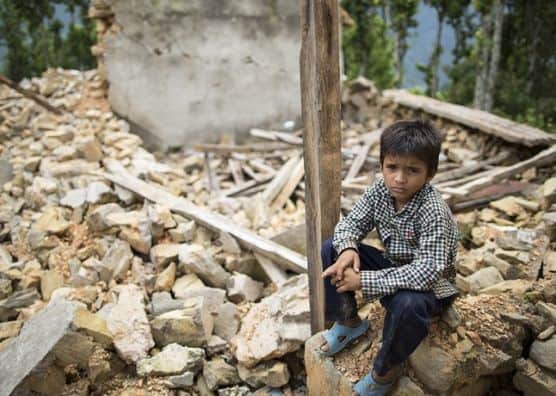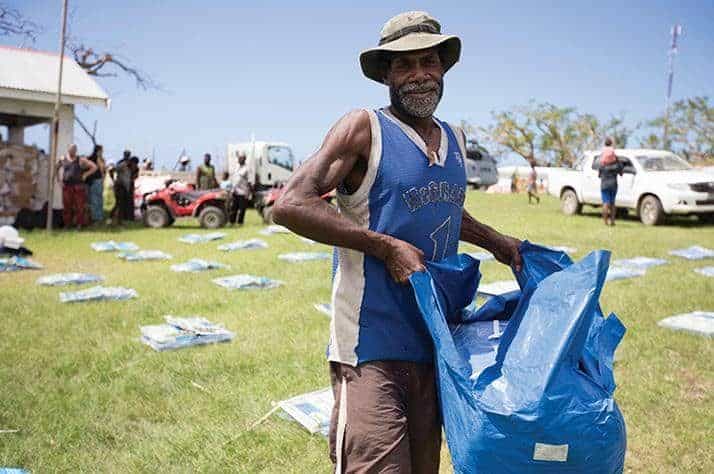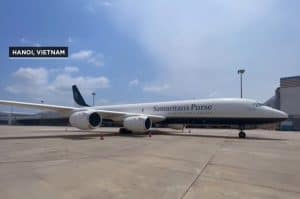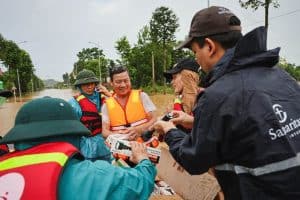Samaritan's Purse looks toward ongoing recovery efforts in Nepal.
Mountains Shaken
The ground started shaking and temples in Kathmandu’s Durbar Square began to sway. The Square, one of Nepal’s most famous historic and cultural sites, was packed with tourists.
Soccer fields were filled with children enjoying the weekend, and churches were concluding their services.
As buildings and homes began to crumble, and the ground continued to shake, people quickly realized this was no usual Saturday morning.
Families fled their homes and took to the streets. All over Nepal’s capital city panic and chaos erupted.
In those initial terrifying moments on April 25, 2015, the city had no idea how far-reaching the devastation would be from the 7.8 magnitude earthquake that rocked the central region of Nepal. In the days and weeks to come the death toll would continue to climb, ultimately surpassing 8,800.
Samaritan’s Purse responded to the earthquake—the worst to hit the region in 80 years—by bringing physical relief in the Name of Jesus. In less than a week we had 30 people on the ground who immediately began coordinating relief efforts in the hardest-hit areas.
The earthquake affected more than eight million people—almost one-third of the country’s population—and damaged or destroyed more than 500,000 homes.
Much of Nepal’s key infrastructure—schools, bridges, roads, and cultural heritage sites— was also damaged. Durbar Square suffered massive damages to its Hindu temples.
Hinduism is very important to the people of Nepal. The South Asian country has the largest population of Hindus living outside of India, and its Christian population is less than one percent.
A Second Hit
The rocks stopped falling and the father saw his chance. He ran as fast as he could, grabbed his two daughters who were standing in the path of the landslide, and brought them to safety moments before rocks began falling again.
“I couldn’t believe the timing,” said Lance Plyler, who led the Samaritan’s Purse medical team in Nepal. “The rocks just barely missed them.”
Plyler was deep in the heart of the Himalayas when the May 12 earthquake hit Nepal, triggering a landslide along the trail where Plyler and his team were traveling to assess needs in remote villages.
The second earthquake sent a new wave of fear and panic among Nepalis, many of whom were still sleeping outside on the ground or in tents.
“They were too scared to go back in,” Plyler said.
Plyler and the team worked to provide comfort and healing. At Anandaban Hospital, Samaritan’s Purse surgeons worked alongside Nepalese doctors to perform 50 surgeries and treat 473 patients.
Food and Water
The earthquake’s aftermath left millions without a way to meet their basic needs. So within one month of the first earthquake Samaritan’s Purse had chartered eight cargo flights in order to get desperately needed relief supplies to earthquake victims.
We distributed emergency kits to 60,847 households in 17 of the worst-hit districts. The kits included blankets, two tarps, kitchen supplies, hygiene items, soap bars, a jerry can and water purification tablets.
Samaritan’s Purse also met immediate food needs by distributing rice, beans, oil and salt to nearly 14,000 households.
Water, sanitation, and hygiene were also major problems. More than one million people needed clean drinking water. Without access to latrines, the risk of water-borne diseases increased. Thousands of Nepalis whose homes were destroyed moved to displacement camps where the risk of these diseases was even greater because of overcrowding.
Our staff traveled to villages and displacement camps to build latrines and hand washing stations, install water filters, and distribute latrine kits and hygiene kits.
Shelter and Warmth
As relief transitioned into recovery, our staff determined shelter as a top priority. And with monsoon season quickly approaching, bringing the threat of heavy rains and mudslides, we had no time to waste.
Our shelter kits served 24,379 families, most living in remote mountain villages. About 80 percent of Nepal’s population lives in rural villages. The country’s extreme terrain, coupled with impassable roads due to earthquake-related flooding and landslides, made already-remote villages even more isolated.
Some people walked as many as eight hours to receive their shelter materials. Older adults brought their children and grandchildren so they could help carry the materials on the long journey home.
The kits included iron sheets, steel pipes, wire, plastic, and a tool kit. Samaritan’s Purse held trainings to teach families how to most effectively use the shelter materials.
Learn how Samaritan’s Purse is providing homes to the vulnerable after Nepal’s earthquake
On the heels of monsoon season came the harsh Nepal winter. Families braced to endure extreme temperatures, which could have proven fatal for those who lost everything in the earthquake and had no way to keep warm.
We provided winterization kits by helicopter to several remote communities in five districts. The kits included a sleeping mat, solar lamp, hats, socks, gloves, thermal underwear, hot water bottles, blankets, jackets, and a bivy sack (small sleeping bag).
The winterization kits reached 10,435 households.
Moving Forward
Samaritan’s Purse is working toward ongoing recovery efforts in Nepal, helping communities rebuild their schools, homes and lives. Our goal is to increase efforts in areas such as WASH programs, agricultural projects, and livelihood skills redevelopment.
On this one-year anniversary day we look back with gratitude to God for allowing us to be tangible expressions of God’s love for the people of Nepal.
Please pray for the earthquake victims and our continued efforts to bring physical relief and spiritual comfort.






